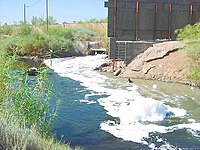
Photo from wikipedia
Abstract Two third of our planet is covered by water, and lakes and rivers are the most important freshwater resources. But the amount of fresh water represents only 2.5% of… Click to show full abstract
Abstract Two third of our planet is covered by water, and lakes and rivers are the most important freshwater resources. But the amount of fresh water represents only 2.5% of the earth's water. Of the earth's fresh water, about 70% is locked up in the continental ice, 30% in underground aquifers and only 0.3% in rivers and lakes. In many water ecosystems around the world, climate change and environmental contamination affect water quantity and quality and water-related ecosystems. It is well known that a fifth of the population in Europe and the America drink contaminated water which does not meet international standard criteria, and also that the consumption of low-quality drinking water is responsible for around 80% of human diseases in the world (official data from World Health Organization, WHO). Thus, the assessment of the integrity of aquatic ecosystems is crucial for its correct management. One of the most critical parameter in evaluating the water resource integrity is the contamination level that can be evaluated by comparing it with equivalent ecosystems in their “natural” (or “pristine”) state. However, because of the global impact of human activities, only Antarctica can be still considered “almost natural”. Persistent Organic Pollutants (POPs) represent one of the most studied class of environmental contaminants due to their well-known carcinogenic and mutagenic effects on living organisms. They are ubiquitous, lipophilic and accumulate in lipid tissues and trough food chains. In this work an overview on the presence of POPs in several aquatic ecosystem around the world will be comparatively discussed with data obtained at the South Pole of our planet. Moreover, the present trend of the presence of POPs at a global level will be evaluated on the basis of concentration profiles as obtained from ice-cores gathered at Victoria Land, Antarctica. Finally, some conclusive remarks are presented on the use of the information available in the management of water resources.
Journal Title: Microchemical Journal
Year Published: 2019
Link to full text (if available)
Share on Social Media: Sign Up to like & get
recommendations!